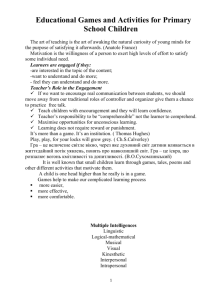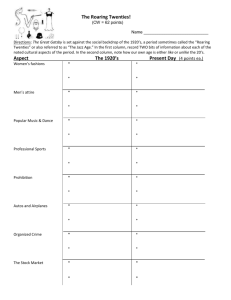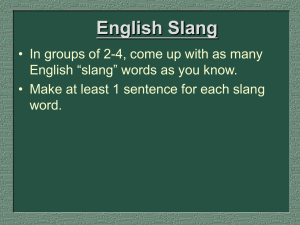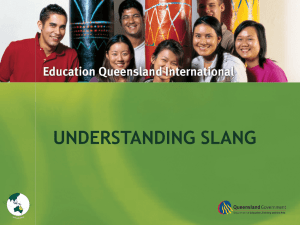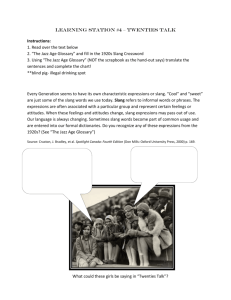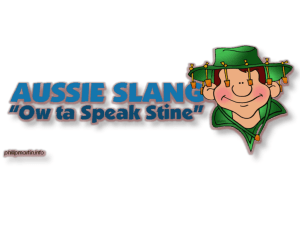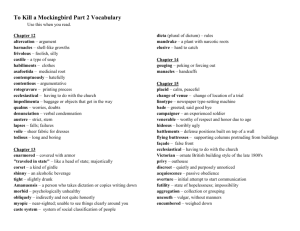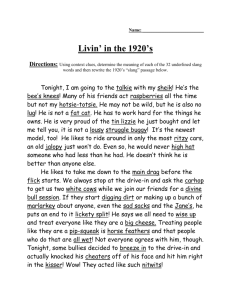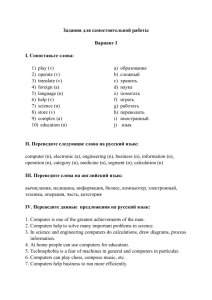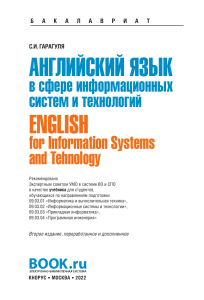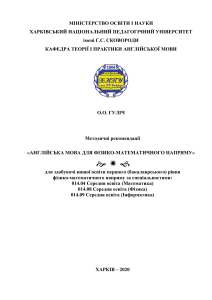English speech innovations in the XXI century
advertisement
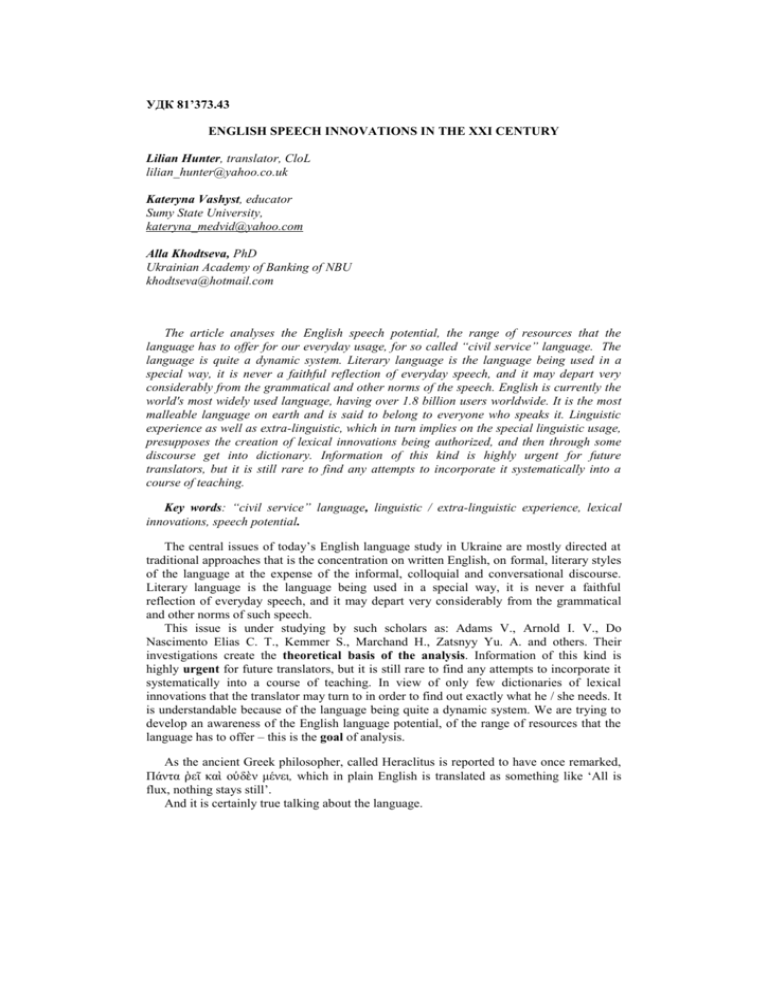
УДК 81’373.43 ENGLISH SPEECH INNOVATIONS IN THE XXI CENTURY Lilian Hunter, translator, CloL lilian_hunter@yahoo.co.uk Kateryna Vashyst, educator Sumy State University, kateryna_medvid@yahoo.com Alla Khodtseva, PhD Ukrainian Academy of Banking of NBU khodtseva@hotmail.com The article analyses the English speech potential, the range of resources that the language has to offer for our everyday usage, for so called “civil service” language. The language is quite a dynamic system. Literary language is the language being used in a special way, it is never a faithful reflection of everyday speech, and it may depart very considerably from the grammatical and other norms of the speech. English is currently the world's most widely used language, having over 1.8 billion users worldwide. It is the most malleable language on earth and is said to belong to everyone who speaks it. Linguistic expеrience as well as extra-linguistic, which in turn implies on the special linguistic usage, presuppоses the creation of lexical innovations being аuthorized, and then through some discourse get into dictionary. Information of this kind is highly urgent for future translators, but it is still rare to find any attempts to incorporate it systematically into a course of teaching. Key words: “civil service” language, linguistic / extra-linguistic expеrience, lexical innovations, speech potential. The central issues of today’s English language study in Ukraine are mostly directed at traditional approaches that is the concentration on written English, on formal, literary styles of the language at the expense of the informal, colloquial and conversational discourse. Literary language is the language being used in a special way, it is never a faithful reflection of everyday speech, and it may depart very considerably from the grammatical and other norms of such speech. This issue is under studying by such scholars as: Adams V., Arnold I. V., Do Nascimento Elias C. T., Kemmer S., Marchand H., Zatsnyy Yu. A. and others. Their investigations create the theoretical basis of the analysis. Information of this kind is highly urgent for future translators, but it is still rare to find any attempts to incorporate it systematically into a course of teaching. In view of only few dictionaries of lexical innovations that the translator may turn to in order to find out exactly what he / she needs. It is understandable because of the language being quite a dynamic system. We are trying to develop an awareness of the English language potential, of the range of resources that the language has to offer – this is the goal of analysis. As the ancient Greek philosopher, called Heraclitus is reported to have once remarked, Πάντα ῥεῖ καὶ οὐδὲν μένει, which in plain English is translated as something like ‘All is flux, nothing stays still’. And it is certainly true talking about the language. As we are privileged to visit London, we will talk about the changes to the English language we more or less witnessed. The Standard or the Queen’s English is the English language as written and spoken correctly by educated people in Britain. But you will hardly hear it spoken in London streets, public transport, places where people work, eat, exercise or are entertained. London provides a rich mine of material for a discerning linguist, being a great melting pot of different cultures and languages, which invariably enrich urban dialects most widely used in this huge city. New words, phrases and pronunciation perceived as trendy can then spread all over the UK and the world. Of course the final, official seal of approval for a new term is to be added to the Oxford English Dictionary (OED). The OED is updated four times a year, every March, June, September, and December. Additions include new words, new sub-entries and new senses. Just to give you an example, talking about relatively recent additions, one of favourites has to be the term al desko – a play on al fresco (for food eaten outside, literally ‘in the fresh (air)’ in Italian), it is an adjective and adverb denoting food eaten ‘while working at one’s desk in an office’. A phrase ‘Easy peasy lemon squeezy’ is overheard in a London street. It’s a slang phrase (from an old British detergent commercial) used to express that something is quickly and easily done. A conversation between two teenagers at Hammersmith station: ‘Where have you been, man? I’ve been waiting for you for AGES!!!’ – ‘Sorry, man, got on a wrong bus’. Sounds OK, does it not? Only the two teenagers in question are two white girls of about 12 years old, and obviously from well-to-do families. This is a pure borrowing from the Multicultural London English (MLE), which is said to contain many elements from the languages of the Caribbean, South Asian and African American English, as well as traditional Cockney. ‘Man’ [mæn] is simply used as a singular pronoun here. Teenagers develop their own idioms and expressions to communicate with their peers to the exclusion of everybody else. There are lots of web-sites that offer their help to confused parents who try to guess what the slang means or if it is something they should worry about. Again, some teenage or Internet slang terms like ‘duckface’ (a combination of a pout and a pucker) or ‘OMG’ (Oh My God!) are just a few of the words that are accepted in the English language. New ways of communication – emails, Twitter, ICQ chat rooms, blogs, text messages (SMS), and Internet forums – inevitably led to the development of new slang. It is a ‘secret language’ that Internet users have popularized, and in many cases, have coined. These are mostly acronyms (to save time or key strokes), e.g. ‘IMHO’ (In My Humble Opinion) or ‘LOL’ (Laughing Out Loud). One of the relatively recent additions to the OED is ‘lolcat’: (on the Internet) a photograph of a cat accompanied by a humorous caption written typically in a misspelled and grammatically incorrect version of English. The London’s most celebrated secret language – London rhyming slang (LRS) is not as commonly spoken as it used to be. Of course the London East End is nothing like it used to be in the old days – there are financial institutions and mobile phone shops instead of costermongers and open air markets. However, people still widely use phrases like ‘use your loaf’ (loaf of bread = head) or ‘stop telling porkies’ (pork pie = lie), even without knowing the origin of these idioms. And new rhyming slang evolves (Britney Spears = tears). This year marks the 70th anniversary of the formal acceptance by the Allies of World War II of Nazi Germany's unconditional surrender of its armed forces, known in Britain as the VE Day. You can see Keep Calm and Carry On slogan on products sold everywhere, emblazoned on everything from shopping bags and T-shirts to coffee mugs and throw pillows, including its many variations Keep Calm and Drink Tea, …and Love Chocolate, …and Plot Your Revenge, etc. As you might expect, the sentiment is entirely British, and this slogan was on a motivational poster produced by the British government in preparation for the World War II. The poster was actually placed on hold and never saw the light of day, until a copy was rediscovered in 2000. It has since been re-issued by a number of private companies, and has been used as the decorative theme for a range of products and commercialized ad nauseam. Was it dinned into your head when you were a student that the English language has no double negative? The idea is that double negatives cancel one another and produce an affirmative. However, they are still widely used in English dialects where they do not seem to cause any confusion as to the intended meaning. You can hear: ‘That won’t do you no good’, ‘I can’t find my keys nowhere’, or ‘There is no way you can do nothing about this’. Admittedly double negatives aren’t considered acceptable in current Standard English and you should avoid them in all but very informal situations – or use phrases like ‘not unjustified’ where the double negatives are allowed! Also you can often hear people say things like ‘Can I have more water, please?’ or ‘Can I come in?’ Of course we all know that ‘can’ denotes physical or mental ability and ‘may’ denotes permission or authorization, but these days it is getting more acceptable to use ‘can’ instead of ‘may’ if you are speaking informally. Still, ‘may’ does have its place. If formality and politeness are of utmost importance, you should use ‘may’ to denote permission. So it would be better to say ‘May I have more water, please?’ and ‘May I come in?’ Many people complain about Americanisation of the English language. About a year ago I noticed that when answering the question ‘How are you’, instead of saying ‘I’m fine’ people often respond ‘I'm good’. And though it is NOT a mistake, it still grates on the ear… Apparently, while ‘I'm fine’ is commonly perceived as a generally positive way of saying that there's nothing particularly wrong with you, it also means that there isn't anything superlatively good happening in your life. ‘I'm good’, however, is a positive assertion that your personal situation and the events surrounding it are supererogatory compared to your usual state of being. That is, by describing your state of being as ‘good’, you suggest that your personal situation is definitively satisfactory, in all respects. We all know two very useful basic phrases everybody should master first of all when learning English. They are ‘Yes, please’ (accepting somebody’s offer) and ‘No, thanks’ (rejecting it), e.g. when someone asks 'Would you like some tea' you say 'yes, please' if you are thirsty, and ‘no, thanks’ if you have just had your cuppa. These useful phrases are so common that you can simply say ‘thanks’ if you don’t mean to accept or ‘please’ if you do (which makes sense, as 'thanks' is said after a service has been done, and 'please' is said when asking for a service). ‘I'm good’ can also be very useful as rejection of and ridicule for an offered goods or services by feigning satiation, when ‘No, thank you’ just will not do, e.g. Person A: ‘Would you like to try some of my new recipe? It's Spam Sushi.’ Person B: ‘No, I'm good’. One of the ‘American’ trends is to replace an adverb with an adjective, e.g. ‘He's real good’ or ‘She works real hard’. There are numerous discussions in blogs and on forums bemoaning the death of the adverb in Modern English. Nevertheless, you will not generally hear language like this from better educated people, and you will not often see it in print, apart from advertising, where language has to be short and snappy, e.g. ‘Think big’. Hearing conversations in the streets of London one can’t help but notice the frequent use of the word ‘like’. One of its uses is as a quotative (a grammatical device to mark reported speech) instead of ‘said’, e.g. ‘I’m like: Are we going out tonight? And he’s like: I can’t, I’ve got to work’. ‘Like’ is predominantly used in spoken language, although it can also be seen in emails and text messages. Some people hate it, but others think it amusing and useful in lieu of verbal punctuation. ‘Like’ is also increasingly used as a filler word in a conversation, e.g. ‘That's, like, so unfair’. We all use fillers in spoken language to give us time to think (cf. non-word fillers, such as ‘um’ and ‘ah’), but the appropriation of ‘like’ in this context can be traced to a familiar source of so much modern day slang – American films and television. The advance of the so-called ‘marketing speak’, or jargon of corporate, academic, government, and everyday work and social environments is also reported. Marketing speak is characterised by heavy use of buzzwords (words or phrases that become very popular for a period of time), neologisms, and terms appropriated from specialised technical fields. It is eventually rendered almost meaningless through heavy repeated use in inappropriate contexts. Some people claim that this kind of jargon is damaging not only to the English language but to the UK business. There is an incorrect usage of the term ‘issue’ (My door is open on this issue), and you could also add ‘challenge’ to the list. And of course language spoken by our Ukrainian and Russian friends who have been living in the UK for a long time deserves a paragraph of its own. As being guests at various parties we noticed that children speak between themselves and with their parents in English, while the adults respond to their offspring also in English, and then carry on conversations between themselves in Ukrainian or Russian. As you might imagine these conversations are liberally peppered with some convenient English words and phrases, e.g.: ‘А ми у сатурдей їздили на шоппінг’; ‘У нас вчора був такий бізяк, страшне!!!!’; ‘В нас апойнтмент на сьогодні’; ‘А я їй кажу: Хай тобі дедді включить овен, і печи собі свій кейк!’ English is currently the world's most widely used language, having over 1.8 billion users worldwide. It is the most malleable language on earth and is said to belong to everyone who speaks it. So who knows, maybe you can also add to its development… Linguistic expеrience as well as extra-linguistic, which in turn implies on the special linguistic usage, presuppоses the creation of lexical innovations, being аuthorized then through some discourse get into dictionary. For the future translators this might involve learning how to interpret some innovations of so called “civil service” language or develop speaking knowledge sufficient to communicate with foreigners. А gооd соmmand of English unite both the аbility to usе and the аbility to соmprehend English in use. This might stimulate further constant research into the matter. АНГЛИЙСКИE РЕЧЕВЫЕ ИННОВАЦИИ В ХХІ ВЕКЕ Л. Хантер, переводчик, член Інститута лингвистики, Лондон (CloL); Lilian Hunter <lilian_hunter@yahoo.co.uk> Е.Н.Вашист, преподаватель кафедры иностранных языков; Сумский государственный университет, kateryna_medvid@yahoo.com А.А. Ходцеa, канд. филол. наук; доцент кафеды иностранных языков; «Украинская академия банковского дела» НБУ khodtseva@hotmail.com В статье анализируется речевой потенциал английского языка, диапазон ресурсов, которые язык может предложить для нашего повседневного использования, так называемого языка“civil service”. Язык довольно динамичная система. Литературный язык - это язык специального использования, он никогда не является достоверным отражением повседневной речи и может существенно отходить от грамматических и других речевых норм. Английский в настоящее время наиболее широко используемый язык в мире, имея более 1,8 миллиарда пользователей. Это наиболее податливым язык на земле, он принадлежит всем, кто говорит на нем. Лингвистический опыт, также как и экстра-лингвистический, который в свою очередь влияет на специфику узуса, предполагает креацию лексических инноваций, которые будучи аутентичными, затем через определенный дискурса могут попасть в словарь. Информация такого рода является очень актуальной для будущих переводчиков, но по-прежнему редко можно найти попытки каким-то образом систематизировать ее и включить в процесс преподавания. Ключевые слова: язык“civil service”, лингвистический / экстра-лингвистический опыт, лексические инновации, речевой потенциал. АНГЛІЙСЬКІ МОВЛЕННЄВІ ІННОВАЦІЇ У ХХІ СТОЛІТТІ Л. Хантер, перекладач, член Інституту лінгвістики, Лондон (CloL); Lilian Hunter <lilian_hunter@yahoo.co.uk> К.М. Вашист, викладач кафедри іноземних мов Сумський державний університет, kateryna_medvid@yahoo.com А.О. Ходцева, канд. філол. наук, доцент кафедри іноземних мов; ДВНЗ «Українська академія банківської справи» НБУ khodtseva@hotmail.com У статті аналізується мовленнєвий потенціал англійської мови, діапазон ресурсів, які мова може запропонувати для нашого повсякденного використання, так званої мови“civil service”. Мова є досить динамічною системою. Літературна мова є мовою спеціального використання, вона ніколи не є достовірним відображенням повсякденного мовлення і може відходити від граматичних та інших норм. Англійська – це мова, що найбільш широко використовується в світі, маючи понад 1,8 мільярда користувачів. Вона є найбільш податливою мовою на землі і належать усім, хто говорить нею. Лінгвістичний досвід, як і екстра-лінгвістичний, що в свою чергу впливає на специфіку узусу, передбачає створення лексичних інновацій, які будучи аутентичними, потім через дискурс потрапляють в словник. Інформація такого роду є дуже актуальною для майбутніх перекладачів, але як і раніше, рідко можна знайти будь-які спроби систематизувати її та включити в процес викладання. Ключові слова: мова“civil service”, лінгвістичний / екстра- лінгвістичний досвід, лексичні інновації, мовленнєвий потенціал. LIST OF REFERENCES 1. 2. 3. 4. 5. 6. 7. Adams V. An Introduction to Modern English Word Formation. London: Longman, 1973. – 713p. Arnold I.V. The English Word. – Moscow, 1986. – 295 p. Do Nascimento Elias C.T. Blends: Developing Creative Vocabulary Building Activities // Forum. Vol. 34. № 3 - 4, 1996. – 653p. Kemmer S. Schemes and lexical blends // Motivation in language: Studies in honor of Gunter Radden / Ed. By H. Cuykens T., Berg R., Dirven R. & K.-U. Panther. Manuscript, 2001. – 18 p. Marchand H. The Categories and Types of Present-Day English Word-Formation. M., 1973. – 365p. Зацний Ю.А. Розвиток словникового складу сучасної англійської мови. – З.: ЗДУ, 1998. – 431с. (Zatsnyy Yu. A. The Development of the Vocabulary of Modern English. – Zaporozhye: ZSU, 1998. 431 p.) Зацний Ю.А., Пахомова Т.О. Мова і суспільство: Збагачення словникового складу сучасної англійської мови. – Запоріжжя: ЗДУ, 2001. – 243 с. . (Zatsnyy Yu. A., Pakhomova T. O. Language and Society: Enriching the Vocabulary of Modern English. - Zaporozhye: ZSU, 2001. - 243 p.)
